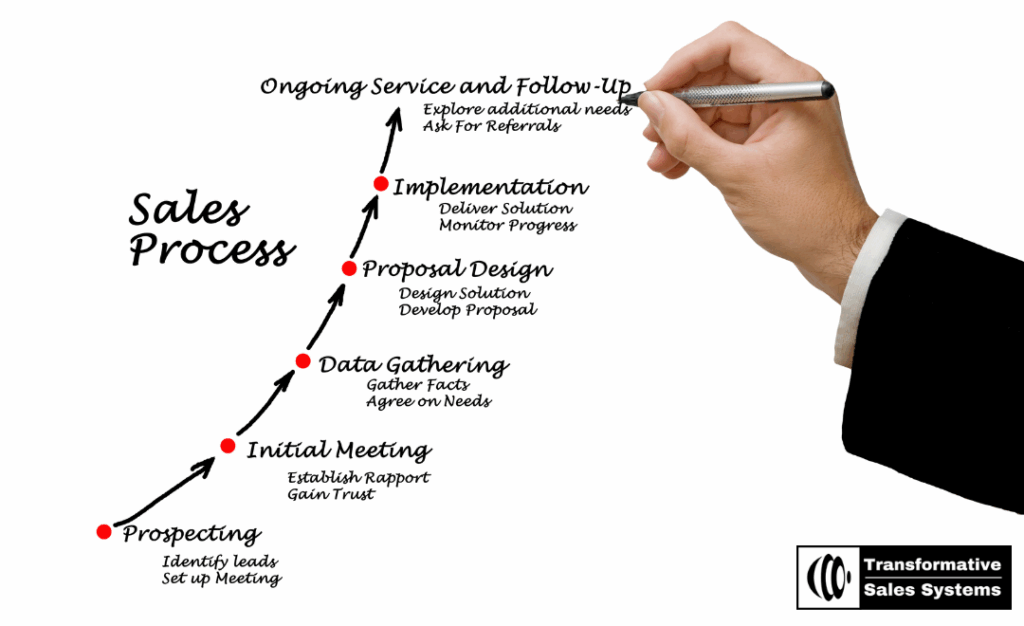What Is a Sales Process and Why It Matters
proc·ess /ˈpräˌses,ˈprōˌses/ – “a series of actions or steps taken in order to achieve a particular end.”
A sales process is exactly that, a repeatable set of actions that guide a prospect from first contact to a closed deal. It creates clarity, consistency, and accountability for your sales team.
Without it, you risk falling into the trap of disorganization, chaos, and confusion. If that describes your current sales efforts, then the answer is clear: you need a sales process.
What Happens Without a Sales Process
Businesses that operate without a structured sales process often struggle with:
-
Salespeople working reactively without direction.
-
Opportunities slipping through the cracks.
-
Deals reduced to price wars instead of value-based conversations.
-
Inconsistent results that make forecasting unreliable.
This is where Fractional Sales Management (FSM) comes in. Many small and mid-sized businesses don’t have the bandwidth or budget for a full-time VP of Sales, but FSM provides the leadership to design, implement, and enforce a sales process, without the full-time cost.
The Core Steps of an Effective Sales Process
While each company can tailor its process, there are universal steps that apply to almost every industry. Here’s a framework that FSM leaders (like Transformative Sales Systems) help businesses put into action:
Step 1: Identify Prospects
Target people or organizations who truly benefit from your solution. These can come from referrals, marketing, cold outreach, or existing customers.
Step 2: Understand Their Needs
Dig beneath surface-level wants. What issues, concerns, or long-term vision do they have? This requires curiosity, listening, and a willingness to walk away if you can’t solve their problem.
Step 3: Identify the Right Solution
Present solutions that resolve their issues or advance their goals. Often, this means helping customers see the difference between what they want and what they truly need.
Step 4: Avoid Competing on Price Alone
If the conversation is only about price, you’re in a race to the bottom. FSM helps sales teams focus on positioning value and walking away when necessary.
Step 5: Test for Commitment
Confirm budget, urgency, and buy-in before moving forward. FSM managers coach reps to qualify rigorously so they don’t waste time on “dead” deals.
Step 6: Gain Agreement on the Solution
Secure verbal alignment before proposals go out. FSM instills discipline so proposals aren’t just documents sent into the void.
Step 7: Present the Proposal
At this point, the proposal is a formality. If the sales process has been followed correctly, the close feels natural instead of forced.
Why is a Process Non-Negotiable for Growth
A defined sales process is measurable, trainable, and repeatable. It allows leaders to pinpoint where deals break down, train salespeople effectively, and forecast revenue with confidence.
But here’s the problem: many CEOs and business owners don’t have the time or experience to build, manage, and coach through a sales process. That’s why Fractional Sales Management exists and to provide seasoned sales leadership that installs the process, holds salespeople accountable, and ensures it drives results.
FAQs
Q: What is the purpose of a sales process?
A sales process provides a structured roadmap, ensuring prospects move from initial contact to close with consistency and clarity.
Q: What happens if a business doesn’t have a sales process?
Without one, sales teams fall into chaos, price battles, and unpredictable results.
Q: How many steps are in a sales process?
Most effective processes include 6–7 steps, but they can be adapted to your business model.
Q: How does Fractional Sales Management help with the sales process?
FSM leaders step in as part-time sales executives. They design and implement the sales process, coach the team, run sales meetings, and provide accountability, giving you all the benefits of a sales leader without the full-time cost.
Get Help Building Your Sales Process
If your business doesn’t have a clear sales process, you’re leaving money on the table. At Transformative Sales Systems, we specialize in Fractional Sales Management for small and mid-sized businesses. We design and implement sales processes that drive predictable growth and then coach your team to execute.
Transformative Sales Systems
812-924-7085
Schedule a 30 minute meeting: https://calendly.com/anthony-nicks/30min
Learn more about Fractional Sales Management at https://transformativesalessystems.com/services/
Read more about Fractional Sales Management: https://www.amazon.com/dp/B0FLWSXX5D

